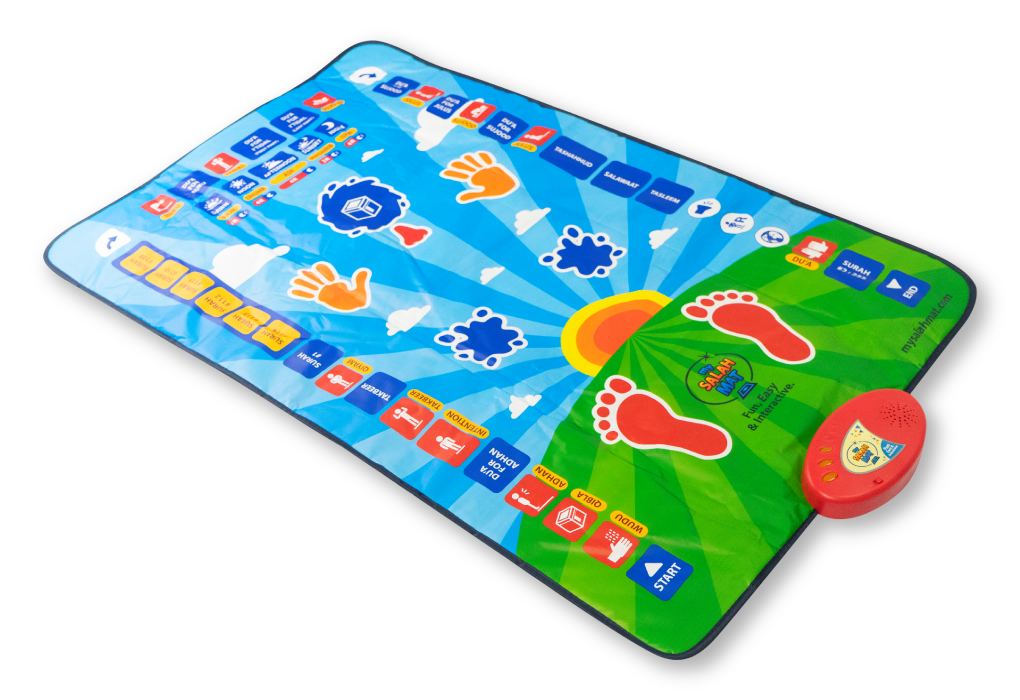Tips on Effective Homeschooling with Practical Experience

According to Wikipedia, homeschooling, also known as home education, is the education of children at home or a variety of places other than school.
According to me, it is educating children in their surrounding environment with a school curriculum. It involves parents, guardians or online tutors and the respective child.
I'll offer tips according to the age group I have at home, which is three to six years old. This is the age group I am familiar with and have homeschooled, Alhamdulillah. Therefore, some tips that have helped me may not work for you. Kindly take note of them.
- Seek Help from Allah ﷻ
It's important to always start a project by seeking Allah’s ﷻ help. It motivates you.
Teaching is passing your knowledge and wisdom to the next generation. It is a noble act, and being able to do it is a special blessing. However, it can be scary too as what you teach is what will be passed on. Thus, if you teach anything incorrect, then it will be passed on as it is- wrong knowledge!
So, seeking Allah's ﷻ help is essential in this journey.

- Have a Specific Study Room/Place
Any surrounding can be used to teach children, but having a specific study area is better as it creates a school environment at home and enhances the kids’ experience.
Children tend to visualize everything they see, and giving them a small space that they call a school area or study area is very important for their little growing minds.
- Gradual Process
Jumping into a new thing in full gear has never brought good results. Introduce learning to them gradually; maybe start the classes with one day on and one day off. Let the children get familiar with the new system. Make it fun and something they look forward to each day.
- Make Great Use of a Planner and Create a Study Time Table
The planner should help you plan your week and track your progress.
Meal menus should be planned. Pre-check groceries and essentials needed for the week. It’s better to go grocery shopping on weekends. You can use the kids’ help, and also consider it a learning moment for them where they identify the fruits and vegetables you need and place them in the trolley. Online shopping can also be a lifesaver. Utilize it when needed.
Pre-make food if possible, or prepare and freeze sauces to preserve them. You can also refer to some DIYs online to prolong food freshness, especially groceries.
Prepare a time table according to the active hours of your child. During the times they are wide awake, teach them the topics they find the most complicated.
The time table might change as per the child's preference, so it’s best to take their behavior and routine as a guide to making these. Also, it’s good to shuffle the time table every few months. That way, it reduces boredom and monotony.

- Visualize the School Environment at Home
Create an experience for them where they leave home for school. You could provide the children with a uniform to wear to their classes and a school bag to keep their books in, or simply have them pretend to take their bikes or walk holding onto each other’s shoulders as a school bus, reading the Du’aa for getting out of the house (which in this case is from one room to the study area).
Kids like to imagine things, and turning their imaginations into reality will make them enthusiastic to do these activities every single day. It's fun when you add a specific song to it. Uplift the spirit of school in the house by fulfilling their imaginary vision.
- Learn About Educational Theories and Strategies that Work with Your Kids’ Intellectual Level.
You don't just wake up one day and decide to homeschool when you do not know where to begin. You can't teach if you have no teaching skills, and these skills are not born but learned. They keep developing as you continue teaching. You need to educate yourself on advanced teaching strategies.
Be flexible with the child's learning preference. The same content can be taught using different methods. Hence, I strongly support the theory of multiple intelligences as it enables us, as humans, to acknowledge the fact that each child is different and each child learns differently.
For example, the letter ق in the Arabic alphabet is for “قطة” (cat).
One of my kids is an audio learner, meaning, she learns through hearing. To teach her, I searched on YouTube for real sounds of animals and found one for a cat. I let her hear it and then pronounce the meow sound after we said the word. I know it's funny, but that's how she learns. My other kid is a visual learner, so I let her color a printed picture of a cat and allowed the image to sink into her memory.
The next time I showed them a cat’s image, they simply started with ق- قطة - Cat- Meow, and we moved on to the next letter using the same process.
- Teach Them Things that Will Benefit Their Future
I grew up learning in a traditional classroom method and all we had was a pen, pencil, colors, and papers. However, the world we live in now is always undergoing technological advancements. It’s hard to keep up with technology, but there’s no harm in giving it a try. In fact, the use of technology could make your homeschooling life very easy.
Also, it’s rare to find a school that teaches kids how to solve their daily problems or teaches them to save money. This is a chance to teach your kids all that you missed learning at your traditional school.

- Multitasking: It’s Easier Said than Done!
This could be in the form of letting them exercise and have P.E. lessons. Try to teach through these fun activities. Whilst they are jumping and running, check their memory by asking them to count their steps in Arabic or English, or by making them sing the alphabet song as they jump

Sometimes, it's okay to let them follow a YouTube P.E. lesson while you take the time to finish your chores.
You are targeting to check their memorization and, at the same time, making them exercise for a healthy productive life. If you are able to join in, then do so!
- Expect Fights and Tantrums in Between the Lessons
It’s not a fantasy. It’s real. So, tantrums are inevitable. Hence, making a peace impeachment is very important if you have more than one kid.
Fights might occur, and it could be something very silly that triggers them. For instance, when you assign the older one to use a computer and the younger one to use a paper, they won't agree peacefully. So, you've got to learn how to resolve these trivial issues and avoid them from re-occurring.
- Team Work
Teaching the same content to children of different ages will need you to master the skill of making them do the same activity in different ways to avoid the occurrence of wars.
For example, I had my older one use a keyboard to type the words we were searching, whilst the other clicked on the mouse following my directions.
The older one was learning how to write, whilst the younger one mastered the image of what we were searching for. It could have been something as simple as an elephant that we were searching for; nevertheless, it was a team effort.
United we stand, divided we fall!
- Switch Roles
Be the student, and let them be the teacher and teach you. It's for fun, and you are also employing Bloom's taxonomy. By letting them teach you what they know, you are allowing them to reveal their knowledge to you.
- Use a School Curriculum to Guide You
Many parents prefer going by their own likes and preferences, but it's essential to make sure your child learns the same content a child attending classes at a school does. The only difference is that you are improvising what you have at home to teach the same syllabus.
- Use Situations to Teach
Sometimes, you may wake up sick, and that is something you can't avoid. However, you can use that day as a break or holiday for the kids, or you can let them learn practically how to tend to a sick person and teach the Du’aas to them.

- Improvise
Make use of the available resources to teach. For instance, to teach addition and subtraction, use the items at home which can be counted.
Using blocks to count can be fun too!
- Patience, Patience, Patience
It can be difficult as first-timers, but when you fall, you get up stronger.
Remember, you are their parent/guardian. They may take advantage of that and use it against you- the motherly/fatherly love.
Giving yourself a break and making the study time shorter will help you rejuvenate and focus on the aspects you need to improve. Self- reflection is also imperative.
Umar (May Allah be Pleased with Him) said: “Judge yourselves before you are judged, weigh your deeds before they are weighed for you...” (narrated by Ahmad in the book Al-Zuhd; page 120)
Sometimes, the problem lies in you and not them. You have to figure that out.
- Follow Through With Your Words
Giving them a warning and not following through with the punishment will give them the idea that their “mommy/daddy is just joking!” They'll grow up with that mentality, causing additional stress to you, where you eventually give up.
Likewise, following through with the rewards when they behave well is also very important.
- Always Have a Back-up Plan
The things you would need in case of emergency, write them down at a place where you can easily go through the list. You can even note them in your planner.
- Involve Them in Chores if they are Interested
Here's what I call “allowing the child to guide you.”
If they want to help with cooking, let them. If they want to help in cleaning and washing clothes, let them be your guest. Use this time to build your interaction and improve your relationship with them. You can even give them lessons on life skills.
In the end, we all do need to learn to wash and clean, and Islam advocates cleanliness. So, take advantage of their interest, and teach them more of it from an Islamic perspective. Bear in mind, be an example of what you teach.

Believe in yourself, and you can do it! However, remember, your kids may feel deprived when they see other kids going to school. The answer to their question will depend on your reasons for opting for homeschooling. Accordingly, be prepared to deal with the situation in a way they can understand.
Plan your life, prepare the necessary schedules, and Tawakkal ala-Allah ﷻ! Tie your camel first. Then, have faith in Allah ﷻ that things will happen according to the best of plans.
By:
Sr. Amatullah B.M
Founder & President of Islamic Reflections Ltd.
Being the founder and the brain of this platform, Amatullah has a mother-like instinct when it comes to Islamic Reflections – her child whom she nurtured on her own at first and then let it grow as the bonds of sisterhood strengthened it and gave it its wings.
A passionate IT enthusiast and a brilliant writer of inspiring quotes and an author, her aim is to spread her knowledge and leave behind a legacy. She is a lecturer by profession doing her part in bringing positivity which this world desperately needs. She's homeschooling her kids using educational teaching methods.
------------------------------------------------------
Jazak'Allah Sr. Amatullah B.M for this incredibly in-depth piece of writing on Homeschooling tips. Insha'Allah we all benefit from this.
------------------------------------------------------
Do you want to get involved with helping other Muslim Parents out there with your own experiences and tips?
Please email with your article ideas!
mysalahmat@gmail.com














 Liquid error (snippets/@AlternatingContentX line 127): Could not find asset snippets/CustomTexts-.liquid
Liquid error (snippets/@AlternatingContentX line 127): Could not find asset snippets/CustomTexts-.liquid